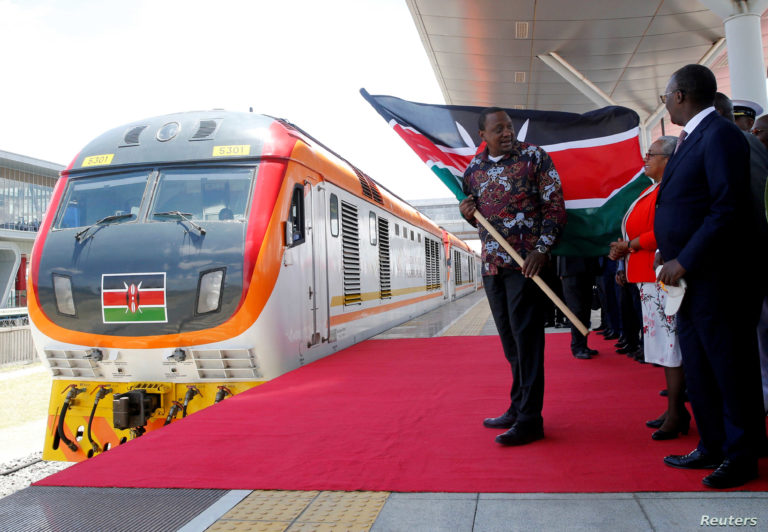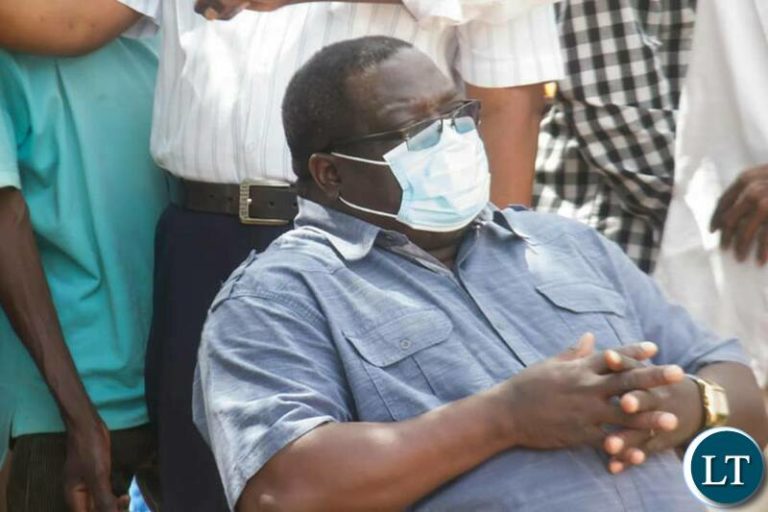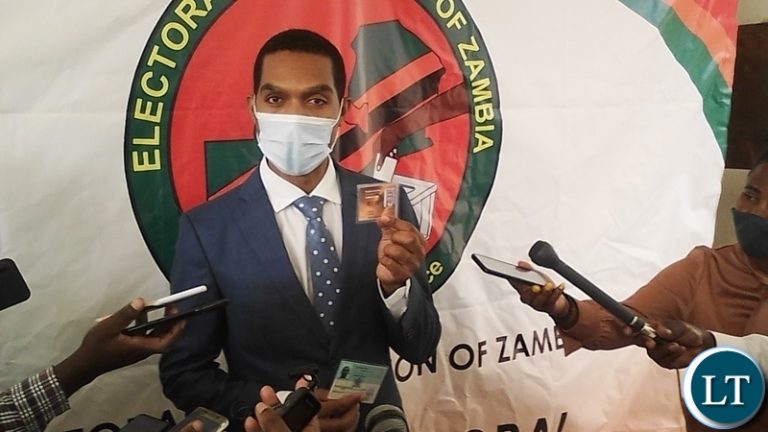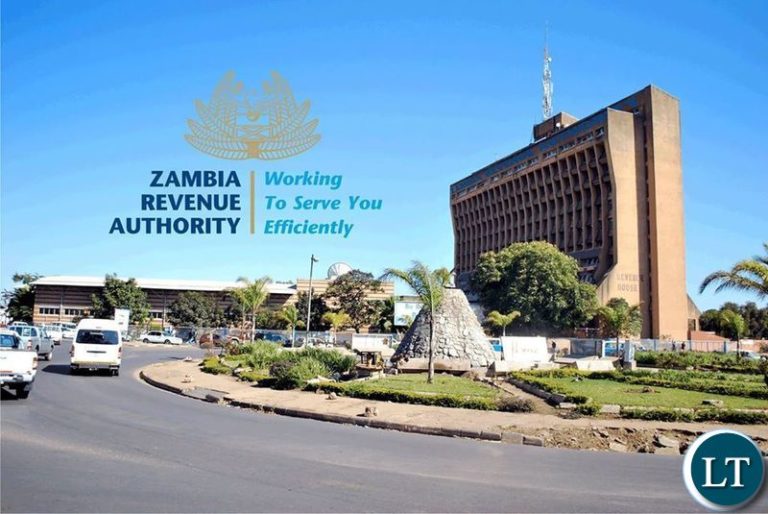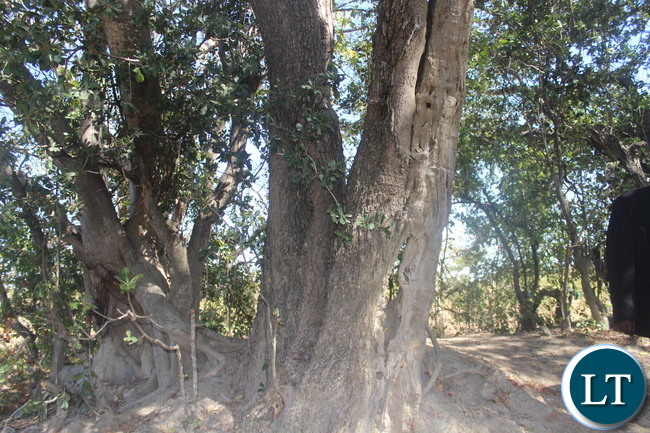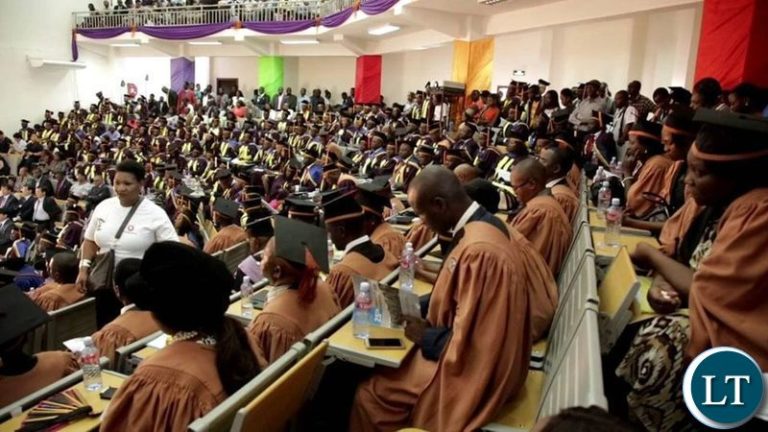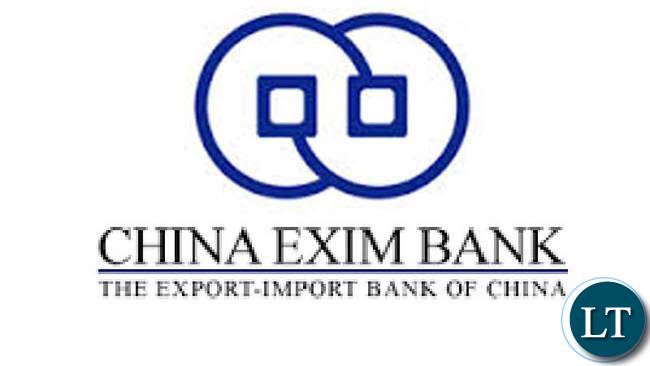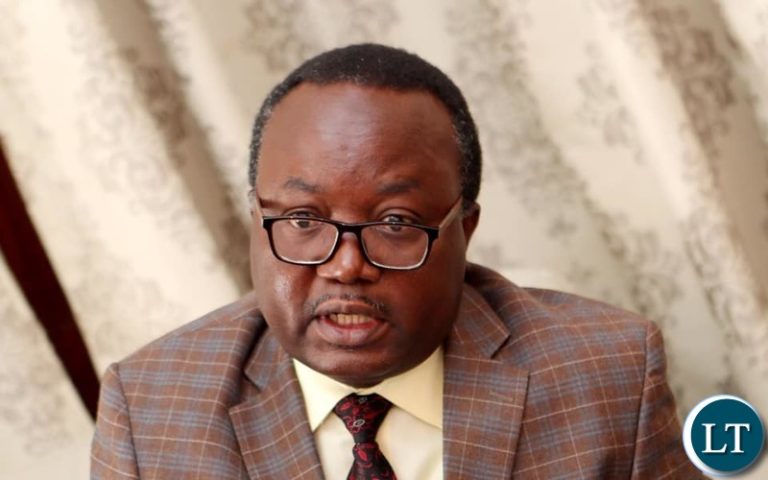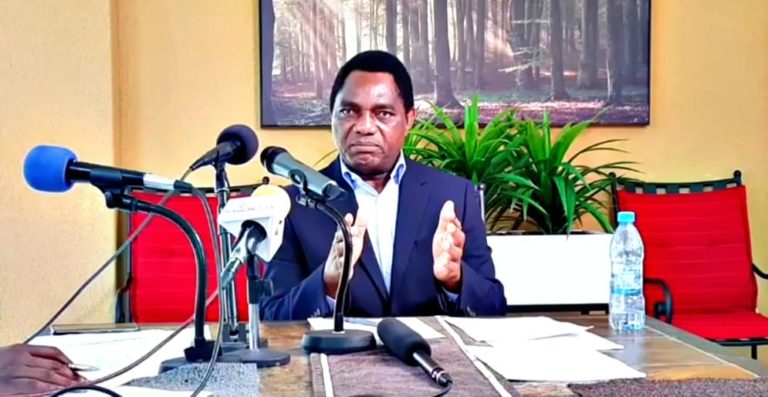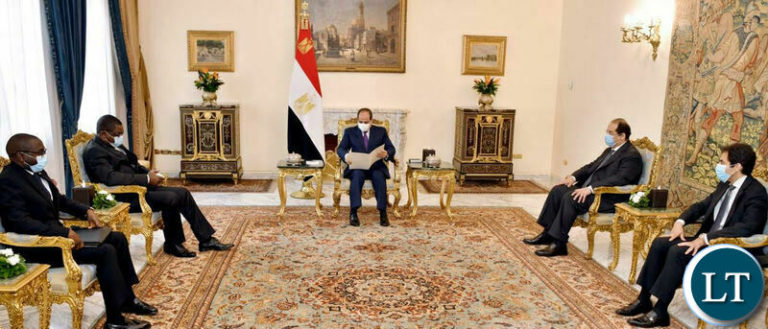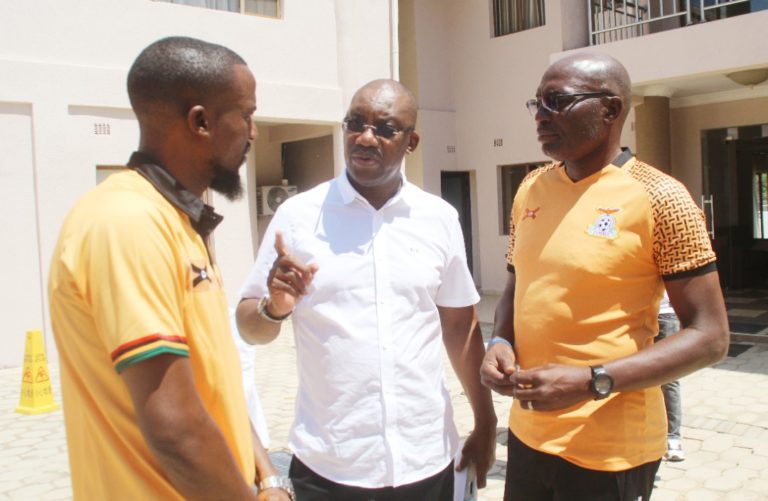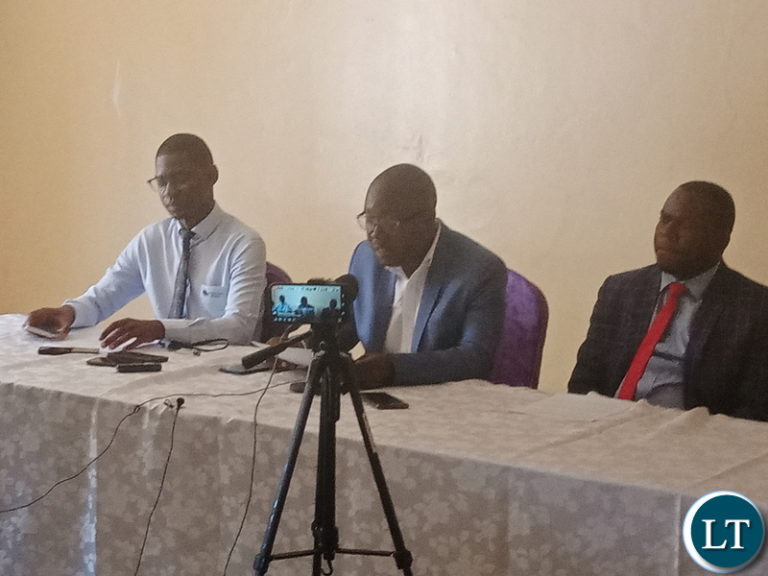At least 120,000 city commuters will use the diesel multiple units deployed by the Kenya Railways Corporation as part of a plan to decongest Nairobi roads. The DMU’s will service 10 routes across Nairobi operating throughout the day. This as part of plans to revamp the train services in the country.
Kambwili found with a case to answer, he defamed President Lungu
National Democratic Congress (NDC) President Chishimba Kambwili has been found with a case to answer in a matter he is accused of defaming President Edgar Lungu.
Lusaka Magistrate Felix Kaoma has placed Kambwili on his defence in the matter which Republican Progressive Party Leader Peter Chanda took to court alleging that he put the name of the President in ridicule by uttering defamatory words.
Particulars are that on 9th September last year, with intent to bring the name of the president into hatred, ridicule, and contempt, Kambwili published defamatory words.
It is alleged that Kambwili defamed the President when he insinuated that the Presidential jet is being used to carry drugs, the words which are suggestive that President Edgar Lung has been trafficking drugs.
When the matter came up for the continuation of trial, the state presented its last witness, Kamima Nyirenda, a pilot at the Zambia Air Force.
ECZ dismisses allegations of favouring UPND Strongholds
The Electoral Commission of Zambia (ECZ) has dismissed allegation leveled against the commission by Civil Society Organizations (CSOs) that data collected by some CSOs on the ongoing voter registration has revealed that the exercise in most UPND strongholds like southern province is faster compared to other provinces that are perceived as such.
In a statement released to the media, the commission said that it would not condone the public profiling of its staff aimed at discrediting ECZ and that the decisions the commission makes are not done by the individuals.
Below is the full statement by ECZ

Yesterday at a joint media briefing, the CSOs accused ECZ of manipulating the voter registration exercise through the unfair distribution of registration kits.
Speaking on behalf of the CSOs, Young African Leaders Initiative –YALI- President, Andrew Ntewewe has since called for the dismissal of ECZ- Manager for Elections, Winnar Mwanamonga and Voter Education Manager, Emmah Mwiinga who they believe are responsible for the unfair manipulation of the electoral process.
Mr. Ntewewe says persons in charge of elections and voter education within the commission have distributed more registration kits to southern province as compared to other provinces with similar voting population, a situation he says is bound to plunge the country into chaos.
He has since challenged the Electoral Commission of Zambia Chairman Esau Chulu and Director of Elections Patrick Nshindano to come out clean and explain how these registrations kits were unfairly allocated.
And the same briefing, Advocates for National Development and Democracy Executive Director, Samson Banda says the ECZ must take these allegations seriously and act immediately as this action may endanger the peace of the country.
ZRA Employee Commended for turning down K 1 million cash Bribe
The Zambia Revenue Authority (ZRA) Assistant Director for Debt Recovery Unit Mr. Joseph Mfula, a has been commended for turning down a K1 million bribe to lower tax assessment payable to ZRA by Opermin Zambia Limited.
Reacting to the arrest of Opermin Zambia Limited Director by Anti-Corruption Commission (ACC) for attempting to corrupt a ZRA officer with K1 million cash, Ibrahim Kabwe Mwamba, PF National Students Mobilisation Coordinator, said he is proud to be alive at a time such as this and applauds ZRA for displaying highest acts of patriotism and dedication to the fight against corruption.
Mr. Peter Samboko, aged 41 of Riverside Kitwe, has been charged with one count of Corrupt Practices with Private Person after he jointly and whilst acting with other unknown persons corruptly offered and gave Mr. Joseph Mfula, an Assistant Director – Debt Recovery Unit at Zambia Revenue Authority, One Million Kwacha (K1,000,000.00) cash as an inducement in order for Mr. Mfula to lower the tax assessment payable to ZRA by Opermin Zambia Limited, a matter or transaction that concerns Zambia Revenue Authority.
This gives confidence to many of us youths who follow with keen interest the operations and activities of the institution tasked to collect taxes on behalf of government.
Credit also goes to Commissioner General as this is clear demonstration of credible and good leadership at the top. We also wish to take this opportunity to recommend for promotion such rare acts of integrity from individuals. Under the prevailing economic situation it’s very easy for someone to fall prey to temptations of corruption but this particular officer showed courage and has instilled confidence in others to follow suit. You have by this act earned yourself and the institution some reasonable mileage of credibility and this must be applauded by every well meaning citizen of our great nation.
Heritage Commission to develop tourist sites to boost tourism
The National Heritage Conservation Commission (NHCC), says it is committed to develop tourist attraction sites across the country.
NHCC Northern Region Director, Kagosi Mwamulowe said the Commission will endeavour to develop various tourist attraction sites to boost tourism as well as growing the country’s economy in line with the Seventh National Development Plan(7NDP).
ZANIS reports that Mr Mwamulowe said this in Chinsali when he handed over the site to the developer, Bwacha Camping Sites, which has partnered with NHCC to develop Chipoma falls.
He noted that Muchinga Province and the rest of the regions in the northern circuit has great potential for tourism development.
Mr Mwamulowe said the tourist attraction sites in the northern circuit are set to be transformed and make them more attractive by partnering with other developers.
“The event we are witnessing today started in 2008 where stakeholders including the NHCC decided that this area around Chipoma falls be developed so as to attract tourists,” said Mr Mwamulowe.
And Bwacha Camping Sites Director, Joyce Nsamba said her organisation is committed to develop the area to international standards.
“We have plans to construct charrettes, ablution block, restaurant, and other facilities that will attract both local and foreign tourists to visit this place,” said Ms Nsamba.
And a local resident, Peter Chanda called on other residents to render support to Bwacha Camping Sites so that the area is developed.
“We are happy that a local developer is coming to develop our place. This is a welcome move and I appeal to all the residents of Chipoma falls area to support this development,“ said Mr Chanda.
The Chipoma falls is on Chimanabwe river that flows through an attractive series of rapids and cascades averaging about five metres each.
Students on Government Loans who fail to Complete their Studies should pay back the Loans
THE Higher Education Loan and Scholarships Board (HELSB) has clarified that even students who obtained loans from the Loans Board but failed in their studies are required to pay back the loans.
The clarification by the Loans Board follows concerns from some former students that despite having failed to complete their studies, the HELSB is still deducting loans from their salaries.
However, HELSB Corporate Communication Officer Chiselwa Kawanda clarified that all students who obtained loans from the board are required to pay back the loans.
Ms Kawanda in an interview with ZANIS, yesterday, said the former students have to pay back the loans because Government spent money on the short period that they had stayed in school.
Government had to pay for their tuition fees, accommodation and meal allowances when they got admitted into the university hence the need for them to repay the loans, she said.
“We didn’t give them a loan so that they could go and fail. These loans have conditions, the beneficiaries have to pay back whether they spent one month or a year in the university,” the HELSB Corporate Communication Officer said.
Ms Kawanda, however, clarified that the students are only supposed to repay what was spent on them during the period they spent in the university.
In cases where students leave the university but the institution still maintains them on the loans list, then HELSB has to engage management.
Ms Kawanda said if a student is maintained on the loans list, the board still continues to pay the fees to the university.
“So in this case, such students can come to our office and the Loans Board has to recover the loan from the university,” she said.
Ms Kawanda, however, expressed happiness that most of the former students who benefited from the loans are willing to repay them back.
She said HELSB has also started engaging employers to help them recover the loans from the former students.
Ms Kawanda said the challenge sometimes is in locating the students using a National Registration Card because some people tend to have similar card numbers. She said tracing the students is also very difficult especially if they have changed their place of work.
The HELSB started making the deduction in 2018 from students who were enrolled into universities in 2004.
Even those students that benefited from what they were calling grants in the 1980 and some years back can contribute a token to the loans board so that more vulnerable children can benefit from the scheme.
Two British firms seals deal processing mineral materials from tailings dams in Kitwe
TWO United Kingdom (UK) based mining firms joined hands establishing a tailings retreatment plant which will be processing mineral materials from tailings dams in Kitwe.
Copper Tree Minerals and Jubilee Metals Group will be processing materials from the tailing dam behind Kitwe High Court, Nkana East and another place West of Mopani Copper Mines in Kitwe.
The companies will also be involved in remediation of the land beneath the tailings dams to make them suitable for public and commercial use.
Speaking in an interview in Kitwe yesterday, Copper Tree Minerals spokesperson Charlie Chase-Gardener said the jubilee brings on board its in-house expertise which will significantly accelerate the project development cycle.
Several job opportunities are expected to be created by the two companies whose initial investment into the project is although he could not disclose the exact value of the project investment.
“Jubilee will also benefit from the detailed resource analyses and vast process test programmes previously performed by Copper Tree,” he said.
Mr Chase-Gardener said the partnership will create significant employment opportunities in both construction and operations phases.
He said Copper Tree has always employed Zambian companies and workers for drill campaigns, laboratory test work, transportation and logistics.
Mr Chase-Gardener said the two companies remain committed to working with Zambian companies and workers for its construction and operations.
“ Once the process of removing the tails from the dams is complete, about 314 hectares of land will be freed for use, “ he disclosed.
Mr Chase-Gardener said Copper Tree and Jubilee will work closely with the Zambian Government to ensure an appropriate regeneration plan is implemented in the future.
Exim Bank of China accepts to defer interest payments on Zambia’s sovereign loans
China’s Export Import Bank of China (EXIM CHINA) has announced that it is suspending Zambia’s interest and principal payments on sovereign loans totaling $110 million due between 1st May and 31st December 2020.
Secretary to the Treasury Fredson Yamba has announced in a statement issued this evening.
Below is the full statement:
The Government of the Republic of Zambia (the “Government”) is pleased to announce that the Export Import Bank of China (“Exim China”) has advised that it is suspending, within the framework of the G20 Debt Service Suspension Initiative (DSSI), the payment of all interest and principal on sovereign loans amounting to US $110 million due between 1st May and 31st
December 2020.
The move is aimed at helping Zambia ease the debt and liquidity pressures as Zambia mobilizes the necessary resources to fight the COVID-19 pandemic.
Reaching this agreement is an important milestone for Zambia as it undertakes steps to ensure broad based debt relief and equal treatment of creditors in its debt relief efforts.
Government is thankful to the Authorities in China for this debt service suspension and for the friendly relations that exist between the two countries.
This is the second creditor from China to provide relief to the country following a similar gesture by the China Development Bank.
While this this is bilateral debt, we will continue to engage private Chinese lenders based on friendly consultations.
As earlier indicated Government will be transparent in the process of debt relief and will continue to work with all our creditors to reach similar interim agreements around the
deferral of both principal and interest payments.
Such interim debt service deferment agreements will also provide the Government with the necessary time to complete its overall debt strategy aimed at restoring public debt
sustainability.
Issued By:
Fredson K. Yamba
Secretary to the Treasury
Botswana Send Chipolopolo Staring Into The Abyss
Chipolopolo on Monday night return to very familiar territory following a disappointing display and away loss in Botswana in Francistown.
Botswana beat Zambia 1-0 to reclaim third place and send Chipolopolo back to their now customary bottom seat in Group H in the 2022 AFCON qualifiers.
Mosha Gaolaolwe turned in a cross in the 4th minute to avenge Botswana’s 2-1 first leg loss in Lusaka on November 12 and give The Zebras hope of chasing for a top two finish.
Zambia should also thank the post in the 38th minute when Kabelo Seakanyeng hit the woodwork following a breakthrough run from midway inside Chipolopolo’s area.
But Zambia remained untidy in the second half where showed very little quality in their finish.
The major highlight was Fashion Sakala’s 86th minute header from a Kelvin Mubanga throw-in that scraped the beam before the referee generously added five minutes of extra-time.
It is now a mountain to climb for Zambia in their last two games.
They host unbeaten Algeria in their penultimate Group H match on March 23, 2021.
Then, Zambia will make what will hopefully not be a formality trip to Harare on March 30.
Meanwhile, Algeria and Zimbabwe drew 2-2 in the early Monday Group H kickoff in Harare.
Algeria top on 10 points while Zimbabwe has 5 points.
Botswana has 4 points while Zambia has a solitary 3 points after their third loss from four Group H games.
The Economist Magazine’s Report About Zambia is a Lie
BY ISAAC CHIPAMPE
In their 14th November, 2020 edition, The Economist magazine published an opinionated article that at best describes Zambia as a collapsed economy caused by its President’s authoritarian style of leadership and called for neighbouring countries, and the rest of the world to press for regime change.
Now, this is not a new call out because the international media, in tow with the main opposition in Zambia, have been calling for the rest of the world to declare Zambia a pariah state. But it is normal these days for a frustrated opposition to wish a country bad omen as long as that helps in discarding the ruling party from power, patriotism aside.
What is new, however, is the extent to which an internationally recognized and probably authoritative magazine went in demonising President Edgar Lungu. And I assume here that this malicious article was written by the publishers, themselves, and not a correspondent or even one of their reporters because at end, the Magazine does not proffer any disclaimer about the origin of the article but states cheekily that “This article appeared in the Readers Section of the print edition under the headline “Zambia’s descent”.
The online version, however, is a little more blunter with a multi-faceted headline: “The Mugabe model…How to stop Zambia from turning into Zimbabwe…Neighbours and creditors should resist its slide into autocracy and economic collapse.”
And it is in this headline or headlines that one clearly sees the push for regime change. It is obvious that firstly by likening President Lungu to the late Zimbabwean leader, The Economist tries to brand and frame the Zambian President as a dictator, and by doing that they hope Zambia’s bilateral partners would react in a similar way they punished Zimbabwe. But it is also a ploy to force those who hated President Mugabe to shift their focus to President Lungu, that the Zimbabwean leader is no more.
President Mugabe’s nemeses are obviously missing him and now that he is no more they have been looking at which African leader they could calibrate as a dictator. They want to create imaginary authoritarians in Africa because in truth dictators are now in short supply here. The pendulum is moving to them.
In their effort to scandalise and chastise President Lungu and his Government, the magazine tries to portray Zambia as headed for economic destruction and calls for Zambia’s neighbours (who ironically include Zimbabwe, by the way) to embark on a mission to remove President Lungu and his Government from power. Reason?
- President Lungu is more dangerous to Zambia’s economy than covid-19;
- he scares away investors by seizing mines;
- he detains mining bosses;
- he fired the Central Bank Governor for resisting to print money;
- he arrested opposition leaders before the 2016 elections;
- he shut down the main independent newspaper; and
- he has arrested Hakainde Hichilema, the main opposition leader, as well as journalists, musicians and other critics.
The Magazine then makes a clarion call:
“Many Zambians worry that their country is sliding into autocracy and economic ruin, like next door Zimbabwe. To stop that slide, the region and the wider world need to start paying attention now, rather than just sending election observers a few weeks before the poll.”
Obviously, The Magazine painstakingly tries to portray President Lungu as an authoritarian they would like him to be, but at the expense of truth. And “truth” is the heart and soul of good journalism which this respected Magazine has foregone. The Economist is being economical with the truth. For what gain? Only them and their Zambian allies would know. The truth is in all the bullets above, the magazine is either lying or spinning facts i.e slanting facts out of context. There is absolutely no need to explain bullet point by bullet point because every Zambian knows that The Economist Magazine is lying. The authors of this article were either deliberately lying, or were lied to by their sources but what is important is that, out of all these lies above, none would persuade a Zambian to frown upon President Lungu. Why? Because Zambians know these are fibs…outright lies! No amount of demagoguery will skew the thinking of Zambians about the President.
Brand him and frame him in whatever way you like, President Lungu is anything but a dictator. He has allowed the Zambian media to criticize him day in day out. More importantly, through the operationalisation of the Independent Broadcasting Authority (IBA), a plethora of vibrant radio and television stations have been born under President Lungu’s administration. This has allowed citizens to hold Government to account on a daily basis. This has also allowed a plurality of voices on air, unlike before when Zambians relied only on the Zambia National Broadcasting Corporation (ZNBC) for information. President Lungu has also allowed his opponents to criticize him, and sometimes intrusively defame him, on a daily basis. President Lungu has allowed civil society to thrive and they are in numbers here, some of them very critical of him and his Government. He has also not tampered with the independence of the Judiciary, legislature, and critical governance agencies like the Anti-Corruption Commission, the Drug Enforcement Commission, and the Electoral Commission of Zambia, to mention but a few.
It is, therefore, a shame that ignorant international media can pick on him to be a dictator when there are dictators not far from their newsrooms. The world must not worry about President Lungu, they must instead worry about the trajectory being taken by the Western media, especially the likes of The Economist and their ilk.
The author is Special Assistant to President Edgar Lungu for Press and Public Relations
HH demands for K10 million from Tayali for defamation or risk being declared bankrupt
UPND President Hakainde Hichilema has demanded for an apology and retraction of the defamatory words against him issued by Economic and Equity Party Chilufya Tayali or risk paying K10 million for the pecuniary damages caused to his reputation.
In a demand letter addressed to Mr Tayali by M and Associates, Mr Hichilema said he finds the words published by Mr Tayali during his press briefing held on November 15th 2020 and widely broadcast on his Facebook page and ZNBC television injurious and defamatory.
According to the demand letter,Mr Tayali is said to have during his broadcast caused to publish words saying Mr Hichilema should have been in jail instead of aspiring for Presidency in 2021.
Mr Tayali is also said to have accused Mr.Hichilema of having corruptly benefited from the privatisation of state property such as property number 77/A/609 along poplar Avenue in Chelstone township of Lusaka thus depriving a Mr Jere who at the time was the sitting tenant and former ZIMCO employee.
Mr Hichilema’s lawyers further contend that Mr Tayali did contemptuously cause to publish through the media by making public the said proceedings in the matter of Pheluna Hatembo v Hakainde Hichilema in the matter related to farm 1924 of kalomo knowing very well that the same matter was actively before the High Court of Zambia.
“Suffice to say that as a result of your false and malicious utterances, our client has suffered pecuniary damages and non-percuniary damages for the severe harm to the reputation that he has built over the years in his political, business and corporate circles including the erosion of the trust he has earned from the electorate in Zambia”, the letter says.
The lawyers further add that it is on the premise that their client has instructed them to demand for the retraction of the mentioned utterances and issue an unequivocal and acceptable apology to be published in the same manner that Mr Tayali published the words complained about by return of post.
This aspect of the demand also includes a demand for an apology from the ZNBC Board for the unfair airing of defamatory material complained about without following the media ethics of fair coverage.
“Our client also demands that you atone for the pecuniary damage you have caused him in the amount of K10, 000, 000.00 and costs in the amount of K350, 000.00 within 7 days from the date of this letter.In default of issuing a retraction and apology as aforesaid, our client shall be constrained to issue legal process and committal proceedings against you in the High Court of Zambia and we are instructed to proceed to render you bankrupt if you fail to settle the judgment debt and costs to be awarded by the Court so that the semblance of your political career shall be ruined forever”,the demand letter reads.
The demand letter which was delivered to Mr Tayali’s lawyers Rabson Malipenga and Associates is copied to Lukona Chambers,Muleza Mwiimbu and Associates, Milner and Paul Advocates,Malambo and Company,Keith Mweemba and Associates, Lusenga Mulongoti and Associates as well as CL Mundia and Company law firms.
Government directs Kafubu Water to cancel water bills for thousands of customers in Luanshya
Government has with immediate effect directed Kafubu Water and Sanitation Company to write off water bills belonging to four thousand households in Luanshya’s Mpatamatu and Roan Townships amounting to K16 million.
This follows a petition by Luanshya Mayor, Nathan Chanda that the bills be written off because they were slapped on people who had no water running from their taps.
Minister of Water Development, Sanitation and Environmental Protection, Jonas Chanda said government will not allow a situation where citizens are subjected to pay for services they do not receive.
The Minister said this when he called on Luanshya Mayor at his office.
“All bills that where charged on people when these townships never had water must be cancelled immediately. Our people should now start a new and clean page with Kafubu Water and should ensure that they continue paying so that the water utility company’s operations are not affected in the district,” he said.
And Dr Chanda has also announced that President Edgar Lungu has authorised the release of K3 million emergency funds to overhaul sewer systems in the two townships.
He has called for quick action from Kafubu Water once the funds are availed to the utility company.
Dr Chanda said the release of funds is in line with President Edgar Lungu’s commitment to providing clean and safe water and sanitation services.
“I’m happy to announce that his Excellency, President Edgar Lungu has directed us to provide K3million to overhaul the sewer lines in Roan and Mpatamatu townships. Water and sanitation services should move side by side if government’s vision 2030 on water and sanitation is to be met, “ he said.
“This is just an emergency fund to enable us respond to this disaster that I have seen for the first time where raw sewer floats in people’s yards,” Dr Chanda said.
Meanwhile, Luanshya Mayor, Nathan Chanda has praised government for providing a solution to the problem of sewer system which is a life threat to the people.
Mr Chanda disclosed that residents in the two areas have had several diarrhoea complaints because of contaminated water.
He however said he will engage the people and sensitise them on the importance of paying bills to the water utility company.
Mr Chanda said the prompt response from government on the matter will put an end to the sewer and water problems people in the two areas and other parts of the district have been facing.
“I’m so thrilled with this quick response from the Head of State over the sewer problem our people have been facing here,” Mr Chanda said.
Foreign Affairs Minister Malanji meets Egyptian President El-Sisi in Cairo
Egypt’s President Abdel-Fattah El-Sisi discussed means to enhance security cooperation to combat cross-border terrorism in Africa as he received Zambia’s Foreign Affairs Minister Joe Malanji on Saturday.
President El-Sisi and Mr. Malanji tackled the importance of exchanging information between their relevant institutions to eradicate cross-border terrorism within the framework of the continental efforts made in this regard, Egyptian Presidential Spokesman Bassam Radi said.
Mr. Malanji delivered a message to El-Sisi from President Edgar Lungu expressing Zambia’s desire to develop relations with Egypt, boost bilateral cooperation, especially in the fields of trade and the economy, and jointly work to confront African challenges.
President El-Sisi conveyed greetings to his Zambian counterpart and stressed the importance Egypt gives to means of enhancing relations with Zambia, especially in trade and investment, on the bilateral level and the level of the Common Market for Eastern and Southern Africa (COMESA), as well as to enhance joint African work, to help achieve development and stability.
President Sisi asked Mr. Malanji to convey his greetings to his brother, President Lungu, stressing the importance that Egypt attaches to strengthening the relations that bind it to its sister Zambia in various fields, especially trade and investment, at the bilateral level or within the framework of COMESA.
“The president also pointed out to Egypt’s keenness to maximize coordination and consultation with the Zambian side, and President Lungu personally, regarding ways to enhance joint African action mechanisms, so as to contribute to achieving the growth and stability that African countries aspire to,” Rady added.
Rady revealed that “The Zambian foreign minister handed over a letter to President Sisi, written by President Lungu about some issues of bilateral relations,” adding: “The letter expressed the desire to develop those relations and advance the frameworks for joint cooperation between the two countries, especially in the economic and commercial fields.”
The Zambian Foreign Minister also expressed his country’s aspiration to work with Egypt to face the many challenges facing the continent, which require concerted African efforts to confront them.
The Spokesman added that the meeting witnessed a discussion of ways to enhance security cooperation and exchange of information between the relevant agencies of the two countries to combat the phenomenon of cross-border terrorism on the African continent, in complementarity with the relevant continental efforts.
Head of Egypt’s General Intelligence Service Abbas Kamel and Zambia’s ambassador in Cairo attended the meeting.
Kamanga: CAF Coaches Instructors Upgrade Coming
FAZ President Andrew Kamanga says Football House is working on building capacity in instructors for top level CAF B and C coaches courses.
Kamanga said the CAF instructor courses had been delayed because of the limited number of local CAF trainers available but that FAZ has now met all the requirements for classes to commence programme.
“All provinces have hosted two rounds of FAZ D license education. We are mindful that some of our trained coaches in FAZ D are yearning to upgrade their credentials. In this regard, let me make mention here that the CAF C and B license courses that have been pending will be held soon. One of the reasons this program delayed was for CAF to check the availability of certified instructors,” Kamanga said.
“With programs like these, we may soon reach a stage where we will have instructors readily available on home soil. The few that we have are either fully engaged elsewhere or simply unavailable when we need them.
“We are hopeful that we will have enough personnel in the not-too-distant future to ensure that football development does not stall.
“On the CAF C and B, the technical directorate will be making an announcement soon. This exercise has been delayed owing the revised format of the program that requires a longer period and more comprehensive curriculum. FAZ has met all the requirements set by CAF and will soon roll out the courses.”
Zambia currently has five male and one female CAF instructors for the C and B courses.
Meanwhile, 33 coaches including ex Chipolopolo coach Wedson Nyirenda are attending a five -day CAF D and E instructor’s workshop thatstarted on November 13 at Tecla Hotel in Lusaka.
“I am happy that we have continued to build on that program with 33 participants gathered for this program. More gratifying is that all the provinces have representation on this program. It is our desire to ensure that we take football development to all corners of this country,” Kamanga added.
ECZ managers for Elections Accused of Favouring UPND Strongholds During the on going Voter registration
Some Civil Society Organisations have called for the dismissal of the Electoral Commission of Zambia Managers in charge of elections and voter education for manipulating the voter registration process.
The Young African Leaders Initiative (YALI) and Advocacy for National Development and Democracy (ANDD) said Mr Mwanangomba and Ms. Mwiinga are responsible for allocating the highest number of registration kits (308) to Southern Province while allocating smaller numbers to provinces like Copperbelt (227 kits) and Luapula (217 kits) which has the highest number of registered voters.
During a media briefing this morning, Mr. Ntewewe said free and fair elections must begin with a registration process that is free from manipulation and offers fair opportunities for all Zambians and regions to register as voter.
“The Commission seem not to be doing very well with registering voters in manner that is free from manipulation and fairness accorded to all citizens. The Commission must come out clean and explain how these registrations kits were unfairly allocated,” said Ntewewe
The CSOs observed that in areas which appear to be strongholds of the United Party for National Development (UPND), the registration process of voters is taking less than 4.5minutes – 6 minutes for one voter to register while in Lusaka, Coppebelt, Eastern and Luapula is taking 10 to 15 minutes.
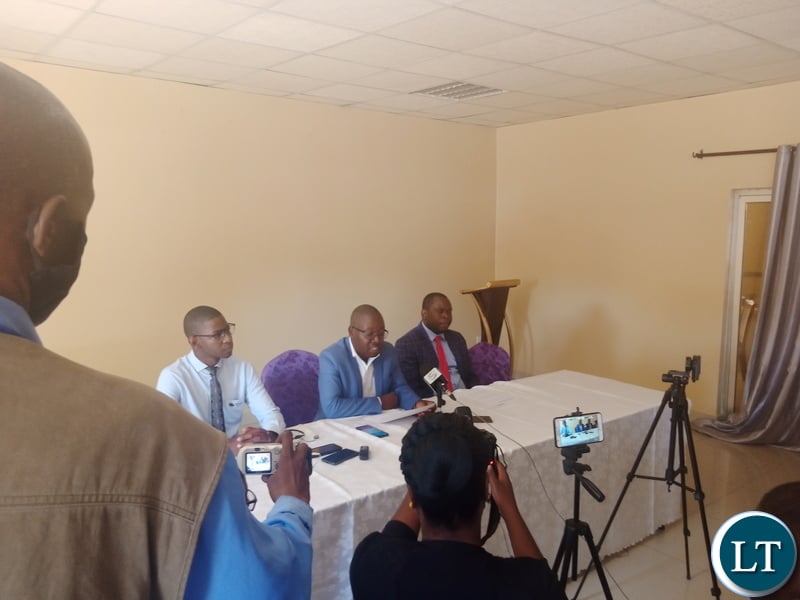
Various stakeholders have expressed concern at slow pace of voter registration since the beginning of the exercise. Former Forum for Democracy and Development (FDD) party spokesperson who is also Chama north parliamentary aspiring candidate, Yotam Mtayachalo expressed worry at a pace in which the voter registration exercise is being undertaken.
Mr Mtayachalo said the slow pace at which the voter registration exercise is moving which commenced on Monday last week by the Electoral Commission of Zambia (ECZ) is extremely worrisome saying unless measures are taken immediately the process may not record a success story.
”The Electoral Commission of Zambia (ECZ) has deployed inadequate staff in registration centres to undertake such an important exercise as people have to wait for too long on the queue to register as voters which is counterproductive, ” Mr. Mtayachalo added.
He said the act can result in many people not register as voters due to frustration adding that as such President Edgar Lungu’s directives to ECZ to deploy more officers in registration centres is timely and a positive development.
The former FDD party Spokesperson further stated that ECZ must realise that with the onset of rain season many Zambians maybe disenfranchised especially in rural areas were accessibility to registration centres may be a huge challenge if contingent measures are not implemented to accelerate the voter registration exercise countrywide.


